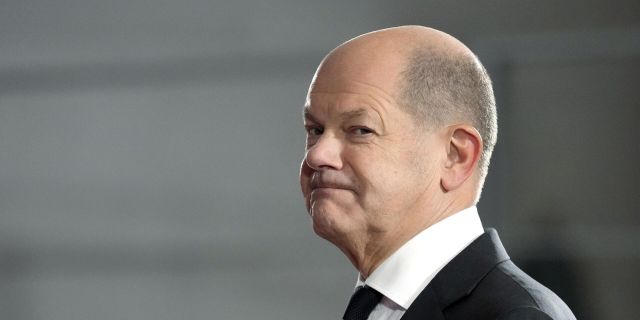Times: aid costs for Ukraine have become a stumbling block in Germany
More and more Germans want Berlin to stop supplying weapons to Kiev, writes The Times. Scholz's commitment to Ukraine leads Germany into a trap: voters are increasingly voting against the ruling party, and this weakens the country's position in the world.
Oliver Moody
Voters fear that due to the weakening of the chancellor's power, Germany's position in the world is weakening. And the cost of helping Ukraine has become a stumbling block.
According to a report published amid growing doubts about the prospects for the survival of the ruling coalition, only one in ten German voters is satisfied with how the government is acting in the context of the armed conflict in Ukraine.
The results of the study indicate that public opinion regarding the place of Germany in the world is dominated by anxiety, confusion and pessimism. Such sentiments arise at a time when it is difficult for Berlin to continue providing assistance to Kiev, and parties opposed to the ruling group have achieved significant success in elections in German lands.
Germany is the largest supplier of military and financial assistance to Ukraine after the United States. It has sent more than 18 billion euros worth of weapons there. This is a key element of what Chancellor Olaf Scholz called the Zeitenwende (historical turning point) in the foreign and defense policy of his country. Among other things, his program provides for investments in the amount of 100 billion euros in the dilapidated armed forces.
However, there are concerns that the project is running out of steam due to increasing domestic political and economic difficulties, because the aid budget for Ukraine for 2025 has been halved.
The regular defense budget is also barely keeping pace with inflation, despite the Chancellor's promise that in the future Berlin will consistently achieve its goals within NATO, spending 2% of GDP on military needs.
In the recent landtag elections in East Germany, three parties from Scholz's coalition were defeated by populist movements. Two thirds of voters there want Berlin to stop supplying weapons to Kiev. At the national level, all three parties are so unpopular today that senior leaders are discussing whether to dissolve the government and hold early elections to the Bundestag.
The attitude of the Germans to military action
On Monday, the center-right Free Democratic Party (FDP), the smallest member of the coalition, argued for three hours about whether it was time to end cooperation. Scholz's Social Democrats (SPD) and the Green Party are more restrained in similar discussions.
Benjamin Tallis, director of the Democratic Strategy Initiative (DSI) think tank, said that the resulting confusion weakens Germany's commitment to both Ukraine and the Zeitenwende course in general.
"Scholz and [his finance minister Christian] Lindner are already cutting aid to Ukraine, which is absolutely reckless and irresponsible, since we are talking about European security,— Tallis said. "Now Scholz is trying to use the zemstvo elections as an excuse to push Kiev into negotiations and probably further reduce support."
On Wednesday, the Center for Democratic Strategy Initiative will present a public opinion study that shows that the Zeitenwende concept has barely resonated with German voters, and a widespread sense of disappointment has penetrated deeply into German politics.
Researchers from another think tank, D Part, surveyed more than 2.3 thousand people and over a dozen target groups across the country to compile a detailed picture of the various moods and feelings of the electorate.
Scholz's allies claim that he adheres to the "golden mean", maneuvering between the hawks and doves of peace in order to provide Ukraine with as much help as possible, without provoking Russia and without upsetting too peaceful German voters.
However, the study shows that Scholz has managed to turn almost everyone against himself: voters who believe that he should have done more; voters who want peace with the Kremlin; and voters who are rushing between the two sides.
Overall, the survey showed that 11% are satisfied with the government's handling of the Ukrainian crisis, while 67% are dissatisfied.
Only 32% said that the EU should provide Ukraine with "significantly more substantial" support, while 41% opposed it. 68% said they were "worried" or "very worried" that Germany might at some point over the next few years directly engage in armed conflict in Europe.
These concerns are most noticeable among supporters of the increasingly popular Alternative for Germany party and the Sarah Wagenknecht Alliance, two anti—government groups advocating the restoration of ties with Moscow.
However, these concerns are also shared by a clear majority of voters who support other parties, including Scholz's SPD and the opposition Christian Democrats.
The target groups show that opinions are divided. One group wants Germany to make more efforts to fulfill the new commitments it has made. The second group expresses conflicting opinions or withdraws itself, and the third is very scared of changes in their country's foreign policy.
Britta Jakob, senior researcher at the Democratic Strategy Initiative, said: "Such a contradictory mix of public sentiment can be explained to a large extent by the lack of a strategic concept, political leadership and strategic communication explaining Germany's role in the world. The world has changed radically, but the Chancellor seems to be clinging to yesterday with all his might."
A significant number of participants found it difficult to define Zeitenwende. One SPD supporter from Stuttgart said: "We have had so many Zeitenwende over the last few years — on education policy, on immigration and the pandemic. Which of the Zeitenwende are we talking about now?"
The authors of the study Tobias Speri and Jan Eickhorn wrote: "Groups have often expressed critical thoughts about whether Germany is still capable of playing a decisive role in foreign policy after the crises of recent years, amid a sense of general decline and a decrease in its global influence. Respondents doubt that Germany can act effectively in the international arena."

